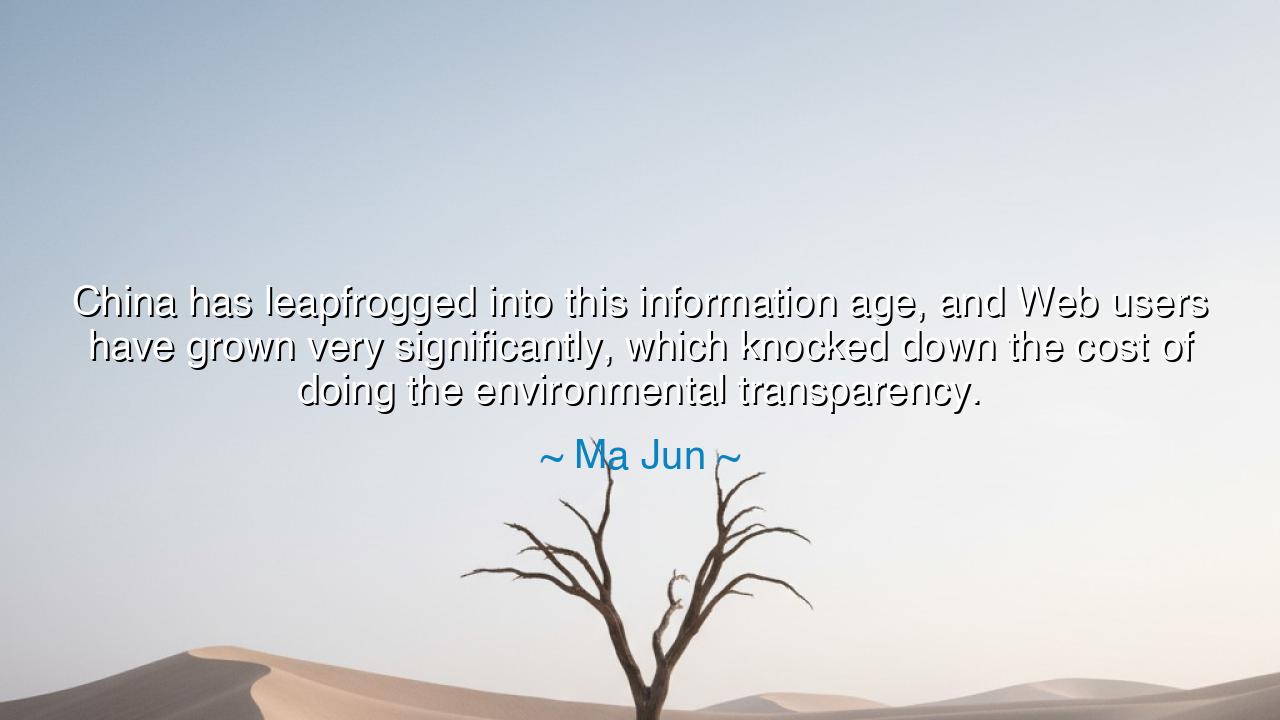
China has leapfrogged into this information age, and Web users
China has leapfrogged into this information age, and Web users have grown very significantly, which knocked down the cost of doing the environmental transparency.






Hear the voice of Ma Jun, who has long stood as a herald of rivers, skies, and truth. He declared: “China has leapfrogged into this information age, and Web users have grown very significantly, which knocked down the cost of doing the environmental transparency.” These words are both a testament to the power of technology and a prophecy of how the people, armed with knowledge, may guard the earth. For he speaks of a transformation where the old barriers of silence and secrecy fall before the strength of information shared widely, freely, and swiftly.
He speaks first of China leapfrogging into the information age. This is not a slow, plodding march, but a sudden leap, a vault over centuries of silence into a time where millions may speak and listen at once. Where once news of poisoned rivers or blackened skies would travel slowly, muffled by distance or censorship, now the Web carries the cry in an instant. A farmer by a dying river may lift his voice online, and within moments, citizens across the nation may bear witness. Thus, what was once hidden in darkness is now brought into light, and the truth cannot be so easily buried.
He then points to the growth of Web users, the millions of ordinary citizens whose presence online creates a new force of accountability. A single voice may be ignored, but countless voices joined together form a chorus that even the powerful must hear. Just as the agora of ancient Athens was a place where citizens gathered to speak and decide, so too does the digital space become the new square of the people, where grievances are aired and truths exchanged. This growth is not merely numbers, but power—the power of connection, which multiplies the strength of each individual many times over.
And Ma Jun reminds us of the great fruit of this leap: it has knocked down the cost of environmental transparency. Once, gathering data about pollution required vast sums, complex systems, and government permission. Now, with the tools of the Web, citizens, NGOs, and journalists can gather, share, and analyze information at little cost. Transparency, which was once a treasure locked away, has become a weapon in the hands of the people. It is as though a gate long sealed has been flung open, and the people may walk freely into knowledge that empowers them to defend their lands and lives.
History offers us a mirror. In the days before the printing press, knowledge was hoarded in monasteries, guarded by the few. But when Gutenberg’s invention spread books across Europe, literacy and ideas flourished. The Reformation, the Enlightenment, and revolutions of freedom were all fed by this sudden flood of information. So too, Ma Jun tells us, does the information age bring about a new awakening: not of faith or philosophy alone, but of environmental awareness, where the people, armed with facts, may demand justice for their rivers and skies.
The deeper meaning of his teaching is that truth is most dangerous to those who would harm the earth. Silence is their shield, secrecy their ally. But when information flows freely, their deeds are exposed. In this way, the Web itself becomes a kind of tribunal, where the polluter may be judged by the court of public conscience. Yet this power is not automatic; it must be used wisely. The people must not only consume information, but act upon it—organize, demand change, and press leaders to honor the balance of nature.
What lesson, then, must the children of tomorrow learn? It is this: that technology is not neutral, but a tool. It may serve greed, distraction, and division, or it may serve justice, truth, and renewal. Choose, then, to use it for good. Share not only trivialities but truths. Seek out not only entertainment but knowledge. Stand with those who reveal pollution, corruption, and harm, for they are the new prophets in this digital wilderness. And remember always that transparency is not the end, but the beginning; it must be joined to courage and action.
So I say to you, listener: let Ma Jun’s words be a lamp. Use the tools of your age to guard the earth, to hold the powerful to account, and to raise your voice with the voices of many. For when knowledge flows freely, darkness retreats. When the people are connected, the land has guardians. And when transparency reigns, the rivers may yet run clear, and the skies may shine once more.






AAdministratorAdministrator
Welcome, honored guests. Please leave a comment, we will respond soon